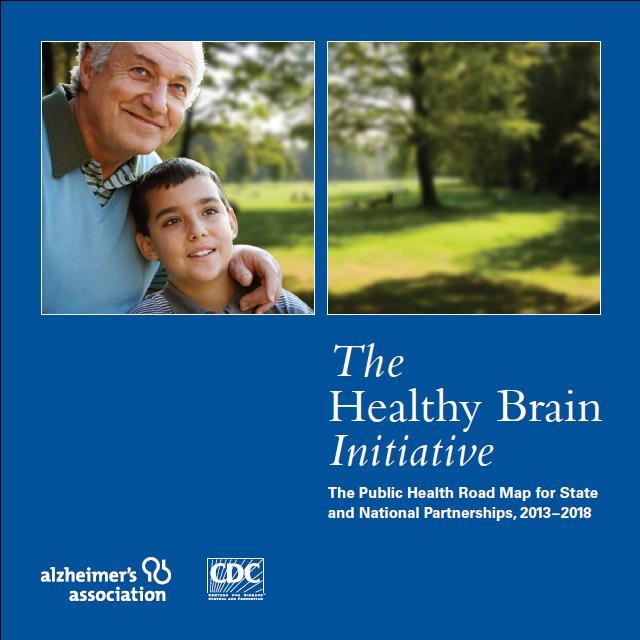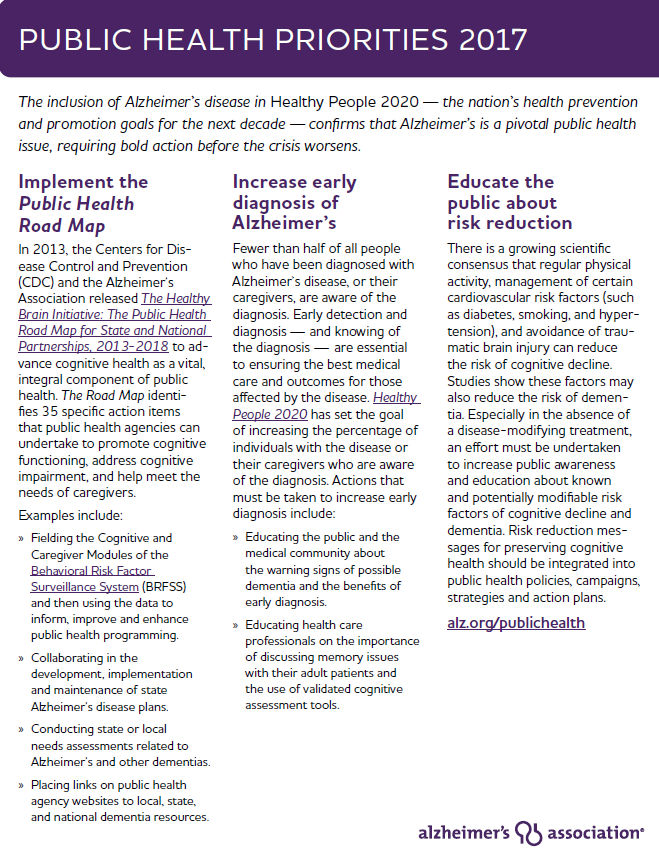Upcoming Webinar: Conducting State Needs Assessments
 The Association of State and Territorial Health Officials (ASTHO) and the Alzheimer's Association will co-host a webinar exploring the role of public health in conducting state or regional needs assessments related to Alzheimer’s and other dementias on June 8 from 3:00-4:00 p.m. EST. Please register in advance. The Association of State and Territorial Health Officials (ASTHO) and the Alzheimer's Association will co-host a webinar exploring the role of public health in conducting state or regional needs assessments related to Alzheimer’s and other dementias on June 8 from 3:00-4:00 p.m. EST. Please register in advance.
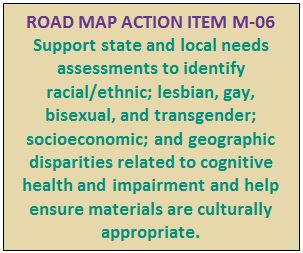 The webinar will feature presentations from Dr. Babak Nayeri, Clinical Associate Professor at the University of Arizona and Director of Healthy Aging for the Arizona Department of Health Services, and Michelle Ries, Project Director of the North Carolina Institute of Medicine, on assessments that were conducted in their states. Molly French, Director of Public Health at the Alzheimer's Association, will also provide an overview of the Alzheimer's Association's Needs Assessment Toolkit. The webinar will feature presentations from Dr. Babak Nayeri, Clinical Associate Professor at the University of Arizona and Director of Healthy Aging for the Arizona Department of Health Services, and Michelle Ries, Project Director of the North Carolina Institute of Medicine, on assessments that were conducted in their states. Molly French, Director of Public Health at the Alzheimer's Association, will also provide an overview of the Alzheimer's Association's Needs Assessment Toolkit.
Comprehensive needs assessments are essential to helping state and local public health officials meet the diverse needs of people with cognitive impairment. As recommended in the Healthy Brain Initiative Road Map, public health practitioners can support local needs assessments to identify and address disparities. Jointly developed by the Centers for Disease Control and Prevention’s (CDC) Alzheimer’s Disease + Healthy Aging Program and the Alzheimer’s Association, the Road Map outlines 35 actions state and local public health officials can take to promote healthy cognition, address cognitive impairment, and meet the needs of caregivers throughout their communities.
Medicare Begins Paying for Comprehensive Care Planning for Alzheimer's Disease and Other Cognitive Impairments
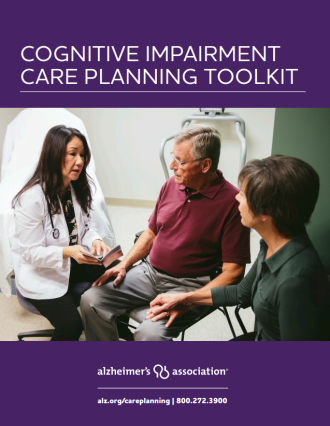 As of January 1, 2017, Medicare will now pay for care planning services for beneficiaries experiencing cognitive impairment, including Alzheimer’s disease. Under new billing code G0505, health care providers can be reimbursed for providing a comprehensive set of care planning services that includes a cognition-based evaluation, functional assessment, and caregiver identification and interview. For more information on the new billing code and to access approved cognitive assessment tools, please review the Alzheimer’s Association Cognitive Impairment Care Planning Toolkit. As of January 1, 2017, Medicare will now pay for care planning services for beneficiaries experiencing cognitive impairment, including Alzheimer’s disease. Under new billing code G0505, health care providers can be reimbursed for providing a comprehensive set of care planning services that includes a cognition-based evaluation, functional assessment, and caregiver identification and interview. For more information on the new billing code and to access approved cognitive assessment tools, please review the Alzheimer’s Association Cognitive Impairment Care Planning Toolkit.
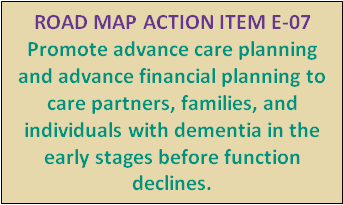 Increased access to robust care planning services – a recommended action item of the Healthy Brain Initiative Road Map – may help persons living with Alzheimer’s avoid unnecessary hospitalizations. Among people living with Alzheimer’s and other dementias, about 25 percent experience a preventable hospitalization resulting in higher health care costs and an increased risk for delirium, falls, pressure ulcers, untreated pain, and functional decline. The Alzheimer’s Association policy brief, Reducing Potentially Preventable Hospitalizations for People Living with Alzheimer’s and Other Dementias, outlines additional policy actions to prevent unnecessary hospitalizations among people with dementia . Increased access to robust care planning services – a recommended action item of the Healthy Brain Initiative Road Map – may help persons living with Alzheimer’s avoid unnecessary hospitalizations. Among people living with Alzheimer’s and other dementias, about 25 percent experience a preventable hospitalization resulting in higher health care costs and an increased risk for delirium, falls, pressure ulcers, untreated pain, and functional decline. The Alzheimer’s Association policy brief, Reducing Potentially Preventable Hospitalizations for People Living with Alzheimer’s and Other Dementias, outlines additional policy actions to prevent unnecessary hospitalizations among people with dementia .
Communicating with People with Dementia: New Educational Videos
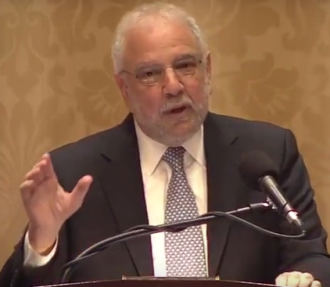 The Healthy Brain Initiative Road Map calls for public health to help the public and professionals communicate effectively and sensitively with people with dementia (action E-06). Now public health and others can use a new educational resource to implement this action. In a series of three videos, Communicating with People with Dementia: Understanding their Selfhood, Dr. Steven Sabat of Georgetown University speaks about the importance of language in communications with persons with Alzheimer’s and other dementias. He describes how the words we choose can lessen the social stigmas associated with dementia. Stories illustrate different communications choices with regards to the selfhood of people with dementia. The three-part series covers: The Healthy Brain Initiative Road Map calls for public health to help the public and professionals communicate effectively and sensitively with people with dementia (action E-06). Now public health and others can use a new educational resource to implement this action. In a series of three videos, Communicating with People with Dementia: Understanding their Selfhood, Dr. Steven Sabat of Georgetown University speaks about the importance of language in communications with persons with Alzheimer’s and other dementias. He describes how the words we choose can lessen the social stigmas associated with dementia. Stories illustrate different communications choices with regards to the selfhood of people with dementia. The three-part series covers:
- The Effects of Labeling Relationships (part 1)
- The Value of Individuality (part 2)
- Normal Behaviors Post-Diagnosis (part 3)
Please visit our Public Health Playlist on YouTube for additional videos on the intersection of public health and Alzheimer’s.
Scholarships Available for Public Health Graduate Students
 Graduate students in public health schools or programs are invited to apply for a $1,000 scholarship from the Alzheimer’s Association. Up to five scholarships will be available to support projects toward a master’s thesis or doctoral dissertation on a topic related to cognitive health, cognitive decline, and/or Alzheimer’s and other dementias as a public health issue. All applications must be submitted by June 20, 2017, at 23:59 ET. Graduate students in public health schools or programs are invited to apply for a $1,000 scholarship from the Alzheimer’s Association. Up to five scholarships will be available to support projects toward a master’s thesis or doctoral dissertation on a topic related to cognitive health, cognitive decline, and/or Alzheimer’s and other dementias as a public health issue. All applications must be submitted by June 20, 2017, at 23:59 ET.
The applicant’s public health school or program must be accredited by the Council on Education for Public Health (CEPH), and the project must relate directly to The Healthy Brain Initiative: The Public Health Road Map for State and National Partnerships, 2013-2018. Learn more about the application process.
Family Caregiving Burden Highest on Women
 Women are more likely to leave their careers or substantially revise their career plans than men to accommodate caregiving for a loved one with dementia, according to a new article published in JAMA Neurology. Further, women lose, on average, $50,000 more in wages than men due to an early exit from the workforce in order to become caregivers ($142,693 lost for women; $89,107 lost for men). Women are more likely to leave their careers or substantially revise their career plans than men to accommodate caregiving for a loved one with dementia, according to a new article published in JAMA Neurology. Further, women lose, on average, $50,000 more in wages than men due to an early exit from the workforce in order to become caregivers ($142,693 lost for women; $89,107 lost for men).
Research - like those referenced above - supports the need for increasing economic support of family caregivers as recommended in Families Caring for an Aging America, a report released by the National Academies of Sciences, Engineering, and Medicine. Highlighting the growing challenges faced by family caregivers, the report outlines several recommendations to ensure better quality of care for both care providers and recipients.
Living Alone with Cognitive Impairment
Approximately 800,000 persons experiencing cognitive impairment live alone. This number comes from the National Health and Aging Trends Study, synthesized in an article published in the American Journal of Alzheimer’s Disease & Other Dementias. Among persons living alone with cognitive impairment, most were female (70 percent) and more than 71 percent were aged 80 or older.
Living alone can make cognitive impairment even more challenging. People with cognitive issues who do not live with others are at higher risk for malnutrition, falls, and wandering away from home. Public health officials can help educate health care providers about the role and importance of care partners, as outlined in the Healthy Brain Initiative Road Map. Learn more about the challenges faced by those living alone with Alzheimer’s.
Analysis Available Online: 2015 BRFSS Data
 Data from the Cognitive and Caregiver Modules in the 2015 Behavioral Risk Factor Surveillance System (BRFSS) survey are now available online through Centers for Disease Control’s (CDC) Healthy Aging Data Portal. Users can obtain various aggregated and state-by-state analyses of data from the Cognitive and Caregiver Optional Modules. Data from the Cognitive and Caregiver Modules in the 2015 Behavioral Risk Factor Surveillance System (BRFSS) survey are now available online through Centers for Disease Control’s (CDC) Healthy Aging Data Portal. Users can obtain various aggregated and state-by-state analyses of data from the Cognitive and Caregiver Optional Modules.
A free webinar from the American Society on Aging will discuss the findings from the BRFSS survey and ways to utilize the data to achieve results. The webinar will be hosted on Tuesday, June 20, 2017, from 1:00-2:00 p.m. EST and will feature presentations from Dr. Lisa McGuire, who leads the CDC’s Alzheimer’s Disease + Healthy Aging Program, and Wayne Tormala, bureau chief at the Arizona Department of Health Services. Please register in advance online for free.
The Alzheimer’s Public Health E-News is supported by Cooperative Agreement #NU58DP006115-02 from the Centers for Disease Control and Prevention (CDC). Its contents are solely the responsibility of the Alzheimer’s Association and do not necessarily represent the official views of the CDC.
For subscription services or to view previous issues of Alzheimer’s Public Health News, please visit http://alz.org/publichealth/public-health-news.asp or contact John Shean (jshean@alz.org).
|
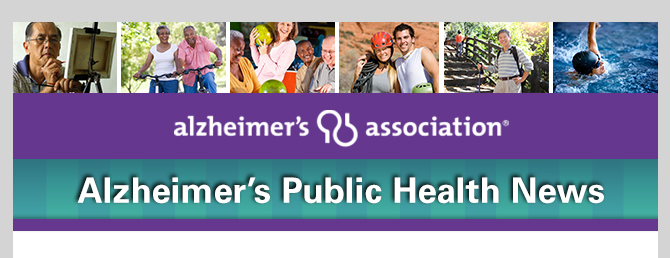



 The webinar will feature presentations from Dr. Babak Nayeri, Clinical Associate Professor at the University of Arizona and Director of Healthy Aging for the Arizona Department of Health Services, and Michelle Ries, Project Director of the North Carolina Institute of Medicine, on assessments that were conducted in their states. Molly French, Director of Public Health at the Alzheimer's Association, will also provide an overview of the
The webinar will feature presentations from Dr. Babak Nayeri, Clinical Associate Professor at the University of Arizona and Director of Healthy Aging for the Arizona Department of Health Services, and Michelle Ries, Project Director of the North Carolina Institute of Medicine, on assessments that were conducted in their states. Molly French, Director of Public Health at the Alzheimer's Association, will also provide an overview of the 
 Increased access to robust care planning services – a recommended action item of the
Increased access to robust care planning services – a recommended action item of the 
 Graduate students in public health schools or programs are invited to apply for a
Graduate students in public health schools or programs are invited to apply for a 
